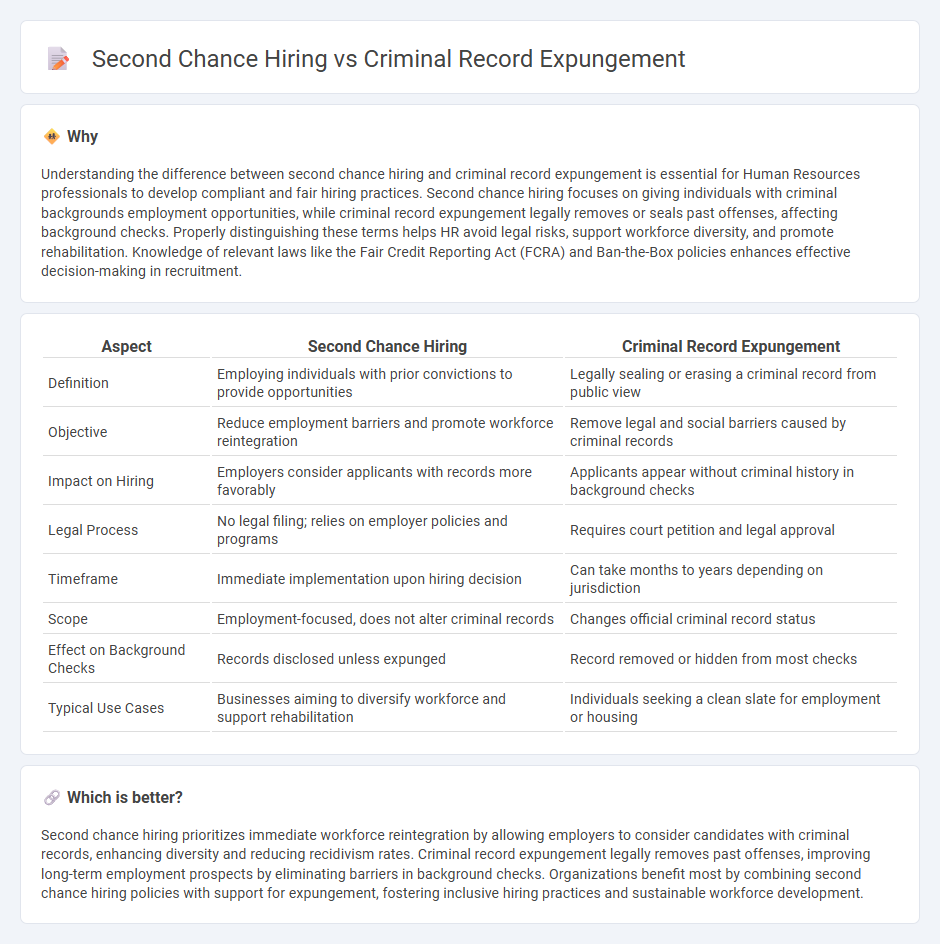
Second chance hiring enables employers to consider candidates with criminal records, promoting workplace diversity and reducing recidivism. Criminal record expungement legally clears past offenses, enhancing job seekers' eligibility and confidence in the hiring process. Discover how these policies transform human resources strategies and improve workforce inclusion.
Why it is important
Understanding the difference between second chance hiring and criminal record expungement is essential for Human Resources professionals to develop compliant and fair hiring practices. Second chance hiring focuses on giving individuals with criminal backgrounds employment opportunities, while criminal record expungement legally removes or seals past offenses, affecting background checks. Properly distinguishing these terms helps HR avoid legal risks, support workforce diversity, and promote rehabilitation. Knowledge of relevant laws like the Fair Credit Reporting Act (FCRA) and Ban-the-Box policies enhances effective decision-making in recruitment.
Comparison Table
| Aspect | Second Chance Hiring | Criminal Record Expungement |
|---|---|---|
| Definition | Employing individuals with prior convictions to provide opportunities | Legally sealing or erasing a criminal record from public view |
| Objective | Reduce employment barriers and promote workforce reintegration | Remove legal and social barriers caused by criminal records |
| Impact on Hiring | Employers consider applicants with records more favorably | Applicants appear without criminal history in background checks |
| Legal Process | No legal filing; relies on employer policies and programs | Requires court petition and legal approval |
| Timeframe | Immediate implementation upon hiring decision | Can take months to years depending on jurisdiction |
| Scope | Employment-focused, does not alter criminal records | Changes official criminal record status |
| Effect on Background Checks | Records disclosed unless expunged | Record removed or hidden from most checks |
| Typical Use Cases | Businesses aiming to diversify workforce and support rehabilitation | Individuals seeking a clean slate for employment or housing |
Which is better?
Second chance hiring prioritizes immediate workforce reintegration by allowing employers to consider candidates with criminal records, enhancing diversity and reducing recidivism rates. Criminal record expungement legally removes past offenses, improving long-term employment prospects by eliminating barriers in background checks. Organizations benefit most by combining second chance hiring policies with support for expungement, fostering inclusive hiring practices and sustainable workforce development.
Connection
Second chance hiring policies improve workforce diversity by enabling individuals with criminal records to secure employment, which reduces recidivism and supports community stability. Expungement of criminal records legally clears past offenses, increasing candidates' eligibility and appeal to potential employers in Human Resources. Combining second chance hiring with record expungement drives inclusive recruitment practices and enhances long-term talent retention.
Key Terms
Background Check
Criminal record expungement legally removes or seals past offenses, significantly enhancing job candidates' prospects by clearing background checks used during hiring processes. Second chance hiring initiatives prioritize giving individuals with criminal records employment opportunities despite background check results, promoting workforce reintegration and reducing recidivism. Explore how expungement and second chance hiring impact background checks to make informed decisions about inclusive hiring practices.
Rehabilitation
Criminal record expungement involves legally sealing or erasing past convictions to remove barriers to employment, housing, and social integration, thereby supporting rehabilitation by allowing individuals a fresh start. Second chance hiring focuses on employers intentionally recruiting candidates with criminal histories to promote workforce reintegration and reduce recidivism through meaningful employment opportunities. Explore how these approaches uniquely advance rehabilitation and contribute to successful reentry initiatives.
Fair Chance Employment
Criminal record expungement removes past convictions from an individual's record, effectively erasing barriers to employment and housing opportunities. Second chance hiring, under Fair Chance Employment policies, encourages employers to consider applicants with criminal histories without automatic disqualification, promoting equitable access to jobs. Explore how these approaches complement each other to enhance workforce inclusion and reduce recidivism rates.
Source and External Links
How To Clear Your Criminal Record in Texas (2025) - YouTube - Expunction in Texas permanently removes arrest, charge, or conviction records for qualifying situations--such as cases dismissed, acquitted, or pardoned--but is not available for deferred adjudication, probation, or certain time-sensitive offenses.
Houston Expungement | Tad Nelson & Associates - Expunction in Texas allows eligible individuals to permanently erase their arrest records if they were never charged, charges were dismissed, acquitted, pardoned, or if the arrest resulted from identity theft, with expunged offenses enabling legal deniability on applications.
Expungement Attorney in Houston | Harris County Criminal Defense - Texas law permits expunction for arrests not resulting in charges, dismissed charges, certain juvenile records, identity theft cases, acquittals, and pardoned convictions, but bars expunction if deferred adjudication, recent felony convictions, or pending charges exist.
 dowidth.com
dowidth.com